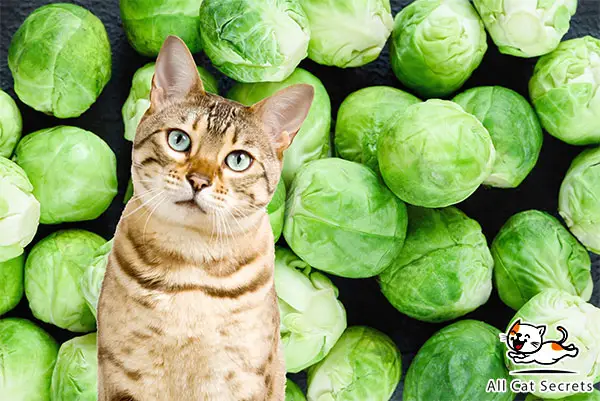The common housecat has lived with humans for thousands of years. Over that duration, these animals have acquired a few dietary habits that distinguish them from their wild cousins.
For instance, while cats in general should be obligate carnivores, the domestic cat doesn’t mind snacking on plant-based human foods from time to time. So, if you’re a proud cat owner who also loves Brussels sprouts, it’s not unusual to find your cat happily scavenging on the remains of Brussels sprouts off the dinner table.
But can cats eat Brussel sprouts?
The answer is a resounding yes. Cats can comfortably eat Brussel sprouts. In fact, Brussels sprouts are grouped among other vegetables like cauliflowers and broccoli, which are generally considered superfoods for cats.
Brussels sprouts boast numerous minerals and phytonutrients that cats may benefit from. And like all vegetables in the cruciferous family, Brussels sprouts abound in powerful antioxidants that could protect your cat from certain ailments. But as you shall find, there are certain precautions to take when feeding Brussels sprouts to cats.
This post delves deeper into the benefits as well as potential risks of Brussels sprouts for cats.
Table of Contents
More About Brussels Sprouts
Perhaps before we delve deeper into the health benefits and potential risks of Brussels sprouts for cats, it’s important to begin by understanding what these vegetables are.
Brussels sprouts, scientifically known as Brassica oleracea, is a vegetable in the cruciferous family, commonly cultivated for its edible buds. Brassica oleracea produces leaves that resemble those of miniature cabbages.
Brussels sprouts get their name from the fact that they’ve been cultivated in Brussels, Belgium, from time immemorial. But like other cabbage species, Brassica oleracea is now native to the Mediterranean region.
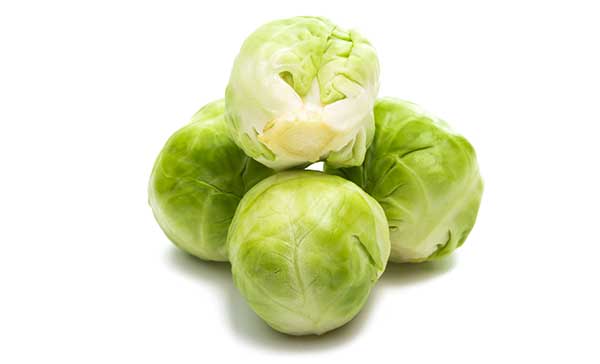
Brussels sprouts are noted for their dense nutritional profile and immense antioxidant properties. The vegetables are also incredibly easy to prepare. You can boil, steam, stir-fry, roast, or grill them. But as you shall find later on, some of these cooking methods are not recommended if planning to serve Brussels sprouts to your cat.
So, can cats have Brussels sprouts?
Again, cats can have Brussels sprouts. All you’ll need to do is follow the recommended preparation methods and offer the vegetable to your feline friend in moderation.
Are Brussels Sprouts Safe for Cats?
Brussels sprouts are perfectly safe for cats. There are no conclusive reports which suggest that your feline friend could die from eating Brussels sprouts.
So, you can go ahead and share Brussels sprouts with your cat with the peace of mind knowing that the animal won’t develop immediate health issues. The same cannot be said about other common plant-based human foods like onions and garlic.
However, note that Brussels sprouts are only safe for cats to the extent that they’re served in moderation. These vegetables should never replace your cat’s regular foods.
Maybe you’ve always wondered, are Brussels sprouts toxic to cats?
As we’ve just highlighted, Brussels sprouts do not present immediate risks to cats.
- High protein cat food dry formula with real chicken as the first ingredient
- Natural with prebiotic fiber nourishes specific intestinal bacteria for digestive health
- Wholesome cat food dry kibble with vitamin A and Omega-6 fatty acids to nourish skin and coat
Last update on 2024-07-13 / Affiliate links / Images from Amazon Product Advertising API
What Are The Health Benefits Of Brussels Sprouts For Cats?
100 grams (3.5 ounces) of raw Brussels sprouts boasts the following nutritional profile;
- Energy – 179 KiloJoules (43 kilocalories)
- Carbohydrates – 8.95 grams
- Sugars – 2.2 grams
- Protein – 3.48 grams
- Fat – 0.3 grams
- Dietary fiber – 3.8 grams
- Water – 86 grams
- Vitamin A: beta-carotene – 5% of the recommended daily intake (RDI) for humans
- Vitamin A: lutein zeaxanthin – 4% of the RDI
- Vitamin B1 (Thiamin) – 12% of the RDI
- Vitamin B2 (Riboflavin) – 8% of the RDI
- Vitamin B3 (Niacin) – 5% of the RDI
- Vitamin B5 (Pantothenic acid) – 6% of the RDI
- Vitamin B6 – 17% of the RDI
- Vitamin B9 (Folate) – 15% of the RDI
- Vitamin C – 102% of the RDI
- Vitamin E – 6% of the RDI
- Vitamin K – 169% of the RDI
- Sodium – 2% of the RDI
- Choline – 4% of the RDI
- Calcium – 4% of the RDI
- Zinc – 4% of the RDI
- Magnesium – 6% of the RDI
- Potassium – 8% of the RDI
- Phosphorus – 10% of the RDI
- Iron – 11% of the RDI
- Manganese – 16% of the RDI
The following are the various health and dietary benefits that your cat may enjoy from Brussels sprouts.
1. Brussels Sprouts May Aid Digestion
Brussels sprouts are rich in dietary fiber. These vegetables are loaded with both soluble and insoluble fiber, both of which play crucial roles in supporting digestion.
Soluble fiber provides the nutrients required by your cat’s gut microbiota. Gut microbiota refers to the microorganisms that live throughout a cat’s digestive tract, which promote digestion. Some studies have also linked soluble fiber with reduced risks of blood and cardiovascular diseases.
Insoluble fiber, on the other hand, promotes digestion by bulking up stool while also softening stool consistency. This ensures frequent and easy bowel movement, which may help to relieve various digestive issues like constipation.
- ❤️ More probiotics per serving
- ❤️ Natural Enzymes & Fiber
- ❤️ Use it daily
Last update on 2024-07-14 / Affiliate links / Images from Amazon Product Advertising API
2. Brussels Sprouts May Promote Weight Loss
Aiding digestion isn’t the only way your cat may benefit from the dietary fiber in Brussels sprouts. Fiber-rich foods are also cited for their ability to promote weight loss.
Fiber creates a sense of fullness for longer. That’s necessary in fighting food cravings and hunger pangs.
When mixed into a cat’s regular food, Brussels sprouts may reduce the food portions your cat consumes in one sitting. You’ll also realize that it takes a considerably long duration before your furball feels hungry again.
So, could sprouts help with cat weight loss?
Yes, Brussels sprouts can, indeed, help to keep your cat’s weight in check. These vegetables are packed with dietary fiber, which is known to promote weight loss.
3. Brussels Sprouts May Promote Hydration
Like its other cousins in the cruciferous family, Brussels sprouts boast significant water content. 100 grams of Brussels sprouts contains as much as 86 grams of water.
Therefore, this vegetable may promote hydration.
There are times when cats don’t seem to drink as much water as they should. During such times, mixing Brussels into your kitto’s regular food could make a huge difference in averting dehydration.
4. Brussels Sprouts May Speed Up the Wound Healing Process
Cats may spend up to two-thirds of their day sleeping. But these cute, furballs tend to be hyperactive during their waking hours.
Your cat could easily injury himself while prowling or playing with his other furry housemates. And considering that cats are highly territorial, injuries could also result from turf wars.
Now, Brussels sprouts are rich in vitamin K, the vitamin known to promote wound healing. Vitamin K aids wound healing by inducing the formation of blood clots which are necessary for stopping bleeding.
Vitamin K also plays an instrumental role in enhancing bone growth. It can, therefore, help to guard against degenerative bone conditions like feline osteoporosis.
5. Brussels Sprouts May Help Stabilize Blood Sugar Levels
100 grams of Brussels sprouts contain 8.95 grams of carbohydrates and 2.2 grams of sugars. While this may look a little too much for your kitto, only a negligible amount of these sugars finally get into your bloodstream.
The potential adverse effects of the carbohydrates in Brussels sprouts are neutralized by the high fiber content in the vegetable. Note that much of the insoluble fiber in Brussels sprouts moves through the stomach undigested. In the process, it slows down the absorption of sugars into your cat’s bloodstream.
Multiple studies have shown that increased intake of cruciferous vegetables may decrease the risks of diabetes.
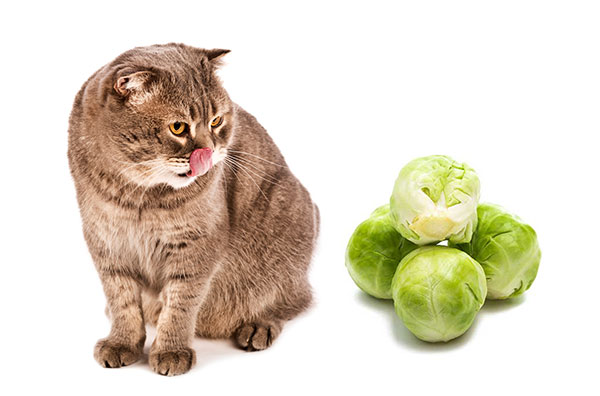
That begs the question, can diabetic cats eat Brussels sprouts?
Yes, the fact that Brussels sprouts come from the cruciferous family of vegetables explains why the vegetable might offer anti-diabetic benefits.
In fact, Brussels sprouts are rich in alpha-lipoic acid, a popular antioxidant widely studied for its positive effects on blood sugar and insulin. These vegetables are also rich in omega-3 fatty acids, which may protect against diabetes by reducing blood triglycerides and insulin resistance.
What’s more, Brussels sprouts are incredibly low in fats. Therefore, you can feed this vegetable to your cat without worrying about cholesterol issues.
6. Brussels May Offer Protective Benefits
Diabetes isn’t the only medical condition in cats that you can manage using Brussels sprouts. The vegetable contains various antioxidants, which may offer protection from a host of other medical conditions. A notable example is vitamin C.
Vitamin C is one of the body’s main antioxidants. It’s also involved in the growth and repair of tissues, as well as the production of proteins like collagen.
Besides vitamin C, Brussels sprouts are also rich in the antioxidant kaempferol, which is noted for its anti-inflammatory properties.
Now that Brussels sprouts contain immune-boosting properties, can cats with kidney disease eat Brussels sprouts?
They sure can. However, follow the thumb rule of moderation. Feeding too much Brussels sprouts to cats with kidney disease may exacerbate the condition as opposed to relieving it.
So, are Brussels sprouts good for cats?
Based on the health and dietary benefits listed above, it’s safe to say that Brussels sprouts are good for cats. But as you shall find in the next section, there are a few side effects to beware of.
Are Brussels Sprouts Bad For Cats?
So far, we’ve gone through a number of potential health benefits of Brussels sprouts for cats. But you might still find yourself wondering, are Brussels sprouts poisonous to cats?
As we mentioned at the beginning, Brussels sprouts are not immediately toxic to cats. However, it’s important to remember that the toxicity of Brussels sprouts depends on how the plants were raised.
Brussels sprouts are generally cultivated in warm, humid environments. High-humid conditions may provide an ideal breeding ground for bacterial growth. A majority of these bacteria are fairly tolerable. But some of them could trigger food poisoning. Sadly, you cannot always vouch for the origin of the Brussels sprouts in your local grocery store. Your only option would be to monitor your cat keenly for any signs of food poisoning.
Another thing to remember before feeding Brussels sprouts to cats is that your feline friend is inherently an obligate carnivore. Obligate carnivores rely almost exclusively on animal products. Therefore, the fact that Brussels sprouts is a plant-based food means there are always risks of gastrointestinal complications.
Common symptoms to look out for include vomiting, diarrhea, loss of appetite, and abdominal pain.
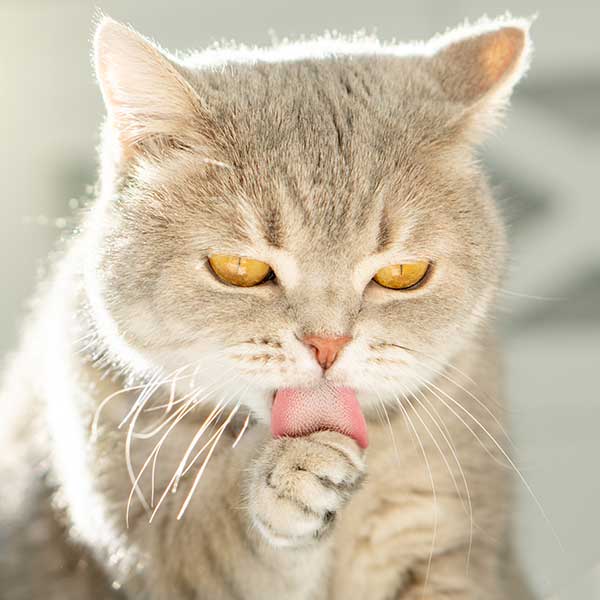
The following are other common issues with Brussels sprouts for cats;
1. Allergy
You probably already know that cats are allergic to various plant-based foods. But are cats allergic to Brussels sprouts?
Although not widely reported, there are chances that your cat may develop Brussels sprouts allergy.
Signs of allergic reactions to expect include;
- Nausea
- Vomiting
- Diarrhea
- Dilated Pupils
- Runny eyes and/or nose
- Difficulty breathing
- Pacing and irritability
- Itching, marked by constant scratching
2. Bloating
Brussels sprouts are also infamous for causing bloating and flatulence. Bloating can result in abdominal discomfort. The best indicative sign of flatulence is incessant farts.
So, do Brussels sprouts make cats fart?
Yes, the fact that Brussels sprouts induce bloating means these vegetables may also cause your cat to fart. However, be sure to rule out other gastrointestinal complications.
- Works as a dog food topper - For pet parents looking for an alternative to capsules, raw treats, or soft chews, all it takes is a...
- A tasty & body nourishing treat for cats & dogs - Essential fatty acids for a healthy coat.
- Powerful Omega Fatty Acids - This premium fish oil liquid formula is loaded with the healthy Omega-3 fatty acid (with epa and dha)...
Last update on 2024-07-13 / Affiliate links / Images from Amazon Product Advertising API
3. Choking Hazards
Last but not least, there are choking risks to beware of. Choking risks increase depending on portion size as well as the part of the crop that your cat consumes.
Can cats eat Brussels sprouts leaves?
Yes, they can. Brussels sprouts leaves are soft enough for cats to chew, provided they’re finely chopped and gently cooked.
Can cats eat Brussels sprout stalks?
Unfortunately, Brussels sprouts stalks are too tough for cats to eat. You may want to cook Brussels sprouts stalks a bit longer before feeding them to your kitto. But that could also denature the phytonutrients in them. So, you’re better off avoiding them altogether.
The best way to avoid the potential adverse effects of Brussels sprouts on cats is to give your feline friend Brussels sprouts in moderation. Vet nutritionists also recommend preparing the vegetable carefully before feeding it to your kitto.
The following section delves deeper into how to prepare Brussels sprouts for your cat.
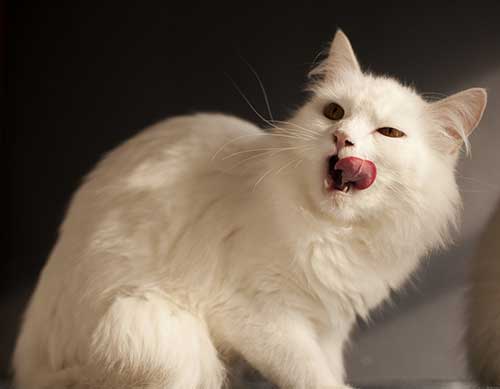
The Dilemma Between Raw versus Cooked Brussels Sprouts for Cats
Can Cats Eat Raw Brussels Sprouts?
Cats can definitely eat raw Brussels sprouts. In fact, feeding raw Brussels sprouts to your cat allows him to enjoy many of the nutrients and minerals in these vegetables.
Just be sure to wash the vegetables properly to eliminate any dust particles and cling-on parasites. Then, chop the vegetables into fine pieces to avoid choking.
Most importantly, ensure that the vegetable was organically grown. That helps to reduce exposure to harmful aerosols.
Can Cats Eat Cooked Brussels Sprouts?
Cats can eat cooked Brussels sprouts as much as they can eat raw ones. However, it’s important to avoid overcooking the vegetable as that could destroy the nutritional elements in it.
It’s also important to avoid cooking methods that involve the use of excess fats, onions, garlic, and salt. These compounds are potentially harmful to cats.
The best way to cook Brussels sprouts for cats is to boil or steam the vegetable.
Can cats eat steamed Brussels sprouts?
Absolutely. As we’ve just highlighted, steaming happens to be one of the best ways to prepare Brussels sprouts for cats.
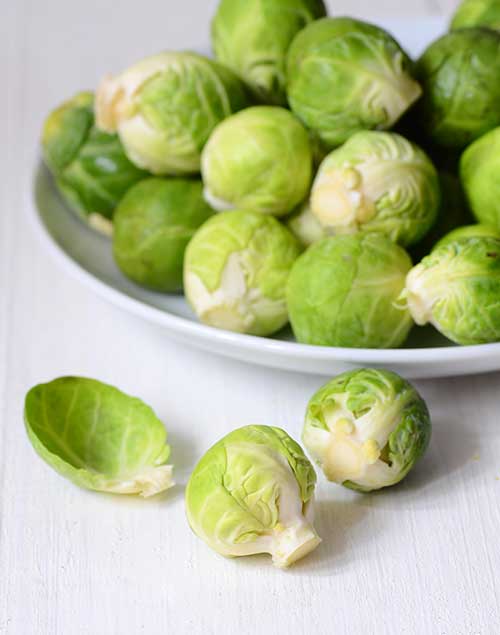
Can cats eat Brussels pate?
Brussels sprouts pate can contain a variety of foods considered toxic for cats, such as flour, onion, and garlic.
So, it’s important to avoid feeding Brussels sprouts pate to your kitto unless you can vouch for the safety of all the ingredients making up the food.
Can cats eat frozen Brussels sprouts?
Freezing is an effective way to denature the bacteria in food. So, cats can eat frozen Brussels sprouts.
However, you’ll need to bring the vegetable to room temperature before offering it to your kitto. Otherwise, your furball won’t enjoy the food due to tooth sensitivity.
Whether raw or cooked, the most important thing to note is how to feed cats Brussels sprouts.
The following is a brief overview on how to serve Brussels sprouts to your cat;
- Chop off the buds from the stalk.
- Gather small-sized and even-sized buds.
- Make a cross-cut in the center of the buds (This promotes heat distribution).
- Clean the buds.
- Boil or steam the buds on low heat.
- Serve the sprouts to your cat as toppings or as a standalone meal.
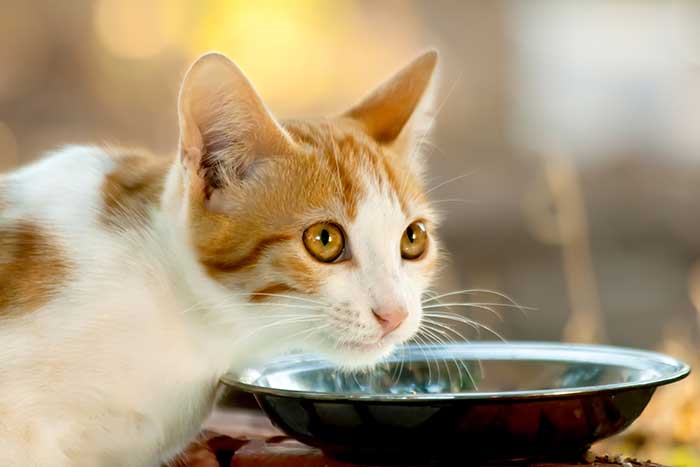
Conclusion
Brussels sprouts are not only safe for cats. These vegetables also pack numerous phytonutrients and antioxidants that your little furball could benefit from.
Just remember to prepare the vegetable following expert recommendations before offering it to your kitto. Most importantly, serve Brussels sprouts to your cat in moderation.
Checkout Our Favorite Cat Products
1. Best Online Course For Cat Parents
Our favorite: The Cat Language Bible (How to Finally Understand And Speak to Your Cat) – A new form of cat to human communication that many cat owners have dreamed about… but few have actually thought possible.
2. Best Immune Support For Cats
Our favorite: Tomlyn Immune Support – Best Supplement for Cats and Kittens.
3. Best Cat Treats
Our favorites: LIFE ESSENTIALS All Natural Freeze Dried Chicken And Sheba Meaty Tender Sticks – Both are Great.

